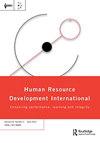对酒店领导者应对COVID-19的跨国分析:前进之路
IF 3.8
Q2 MANAGEMENT
引用次数: 1
摘要
由SARS-CoV-2病毒引起的冠状病毒病(COVID-19)大流行导致全球各行业的经济运营前所未有的中断,导致世界经济陷入停滞(Arora和Suri 2020)。工作场所运作的一夜之间的转变导致了组织运作方式的剧烈变化;这些变化主要是由政府管理病毒对公共卫生影响的任务所推动的。由于商业的性质,旅游和酒店业一直是全球受打击最严重的行业之一(Gursoy和Chi 2020)。在世界范围内,各国政府为拉平感染率曲线而采取的举措包括封锁、关闭国际边境、限制国内和国际航班和邮轮旅行,以及采用六英尺社交距离和戴口罩等标准操作程序。由于存在一定程度的区域差异,COVID-19的影响导致酒店业务关闭,对该行业造成严重影响(Sharma和Mahendru 2020)。由于发达国家和发展中国家的政府都认识到酒店业是经济和社会的主要来源(外汇收入和创造就业,2005年),因此应对COVID-19的影响是行业领导者迫切关注的问题。虽然大流行病在更广泛的接待业务层面造成了高度的不确定性和中断,但也提请注意其对劳动力的影响。从本质上讲,这个行业是高度人力资源密集型的(Jayawardena)简单地说,它需要许多不同层次的员工来运营这个行业(Baum)。在国际旅行中,数以百万计的酒店员工感受到工作时间减少、休假或失业的影响。在大流行之前,为应对这种中断,我们正在调整组织业务。该研究强调了危机事件中领导行动的重要性以及行动中反思方法的意义。对ceo和管理层的正式和在职培训应包括领导渡过危机的内容,以使领导者为管理组织成功复苏做好准备。领导力危机培训应该提供机会,假设测试各种危机管理模型,以确定处理不同类型危机的最佳案例方案。领导者可以接受培训,采用一定的能力来有效地领导,并通过其战略,员工和其他资源实现组织弹性(Wooten和James 2008)。危机管理模型的结果可用于人力资源开发实践,为酒店业如何应对COVID-19的破坏性影响并从中恢复提供指导。本文章由计算机程序翻译,如有差异,请以英文原文为准。
A cross-country analysis of hotel leaders’ response to COVID-19: a way forward
The coronavirus disease (COVID-19) pandemic caused by the SARS-CoV-2 virus resulted in unprecedented economic disruption in global business operations across industries that led to a shutdown of the world economy (Arora and Suri 2020). The overnight transformation in workplace operations caused drastic changes to the way organizations functioned; changes driven primarily by governments’ mandates to manage the public health impacts from the virus. Because of the nature of business, the tourism and hospitality industry has been one of the hardest hit , globally (Gursoy and Chi 2020). Worldwide, governments’ initiatives to flatten the infection rate curve, included lockdowns, closure of international borders, domestic and international flight and cruise travel restrictions, and the adoption of Standard Operating Procedures (SOPs) like the six-feet social distancing and mask wearing. With some degree of regional variation, the impacts of COVID-19 led to the closure of hospitality operations, resulting in serious repercussions for the industry (Sharma and Mahendru 2020). Since governments in both developed and developing countries recognize the hospitality economic and social major generator foreign exchange earnings, and employment creation 2005), addressing the impact of COVID-19 was an urgent concern for industry leaders. While a high degree of uncertainty and disruption had been caused by the pandemic at the broader level of hospitality operations, attention is also drawn to its impact on the workforce. By nature, this industry is heavily human resource intensive (Jayawardena Simply stated, it takes numerous employees at various levels to operate the industry (Baum Any in the industry creates impacts on the workforce. significant in international travels, millions of hospitality employees felt the effect of reduced work hours, furlough, or loss of employment. Prior to the pandemic, a and reshaping organizational operations in response to the disruption. The study highlights the importance of leadership actions during crisis events and the significance of the reflection-in-action approach. Formal and on-the-job training for CEOs and management should include components on leading through crises to prepare leaders to manage the organization into successful recovery. Leadership crisis training should provide the opportunity to hypothetically test various crisis management models to determine best case scenarios for handling different types of crises. Leaders can be trained to adopt certain competencies to lead effectively and to achieve organizational resilience through its strategies, employees, and other resources (Wooten and James 2008). The results from the crisis management model can be used in HRD practice to offer guidance on how the hotel industry can respond to, and recover from, the devastating effects of COVID-19.
求助全文
通过发布文献求助,成功后即可免费获取论文全文。
去求助
来源期刊

HUMAN RESOURCE DEVELOPMENT INTERNATIONAL
MANAGEMENT-
CiteScore
11.40
自引率
11.10%
发文量
43
期刊介绍:
Human Resource Development International promotes all aspects of practice and research that explore issues of individual, group and organisational learning and performance. In adopting this perspective Human Resource Development International is committed to questioning the divide between practice and theory; between the practitioner and the academic; and between traditional and experimental methodological approaches. Human Resource Development International is committed to a wide understanding of ''organisation'' - one that extends through self-managed teams, voluntary work, or family businesses to global enterprises and bureaucracies. Human Resource Development International also commits itself to exploring the development of organisations and the life-long learning of people and their collectivity (organisation), their strategy and their policy, from all parts of the world. In this way Human Resource Development International will become a leading forum for debate and exploration of the interdisciplinary field of human resource development.
 求助内容:
求助内容: 应助结果提醒方式:
应助结果提醒方式:


